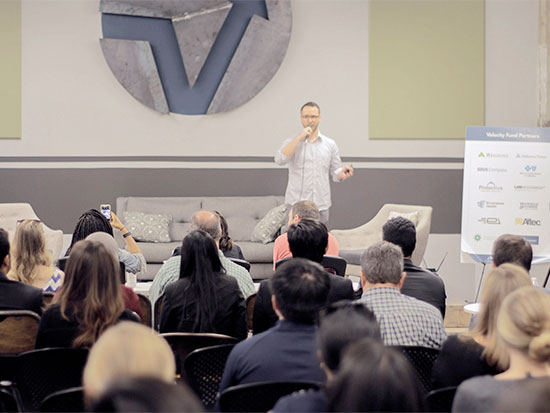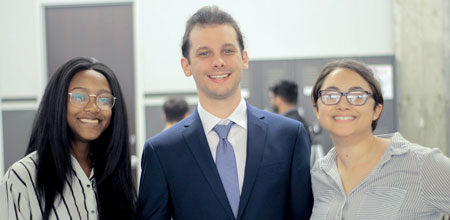 Max Polec, director of UAB Commercialization Accelerator, addresses the audienceDriving economic growth through startups is a priority at the University of Alabama at Birmingham. The first cohort in the UAB Student Accelerator Program provided the foundation to launch two successful startups, with the development of five others. The free program available to all UAB Students provided entrepreneurial training for 29 students this spring, with seven groups pitching their business ideas during Demo Day on April 11. One startup, Fledging, LLC, produced more than $28,000 in revenue during the month of March and continues to see growth due in part to the training provided by the UAB Commercialization Accelerator housed underneath the UAB Harbert Institute of Innovation and Entrepreneurship.
Max Polec, director of UAB Commercialization Accelerator, addresses the audienceDriving economic growth through startups is a priority at the University of Alabama at Birmingham. The first cohort in the UAB Student Accelerator Program provided the foundation to launch two successful startups, with the development of five others. The free program available to all UAB Students provided entrepreneurial training for 29 students this spring, with seven groups pitching their business ideas during Demo Day on April 11. One startup, Fledging, LLC, produced more than $28,000 in revenue during the month of March and continues to see growth due in part to the training provided by the UAB Commercialization Accelerator housed underneath the UAB Harbert Institute of Innovation and Entrepreneurship.
“Research, Innovation and Economic Development is one of the four mission pillars of UAB’s Strategic Plan,” said Kathy Nugent, Ph.D., executive director of the HIIE. “Seizing on the momentum of this focus, the HIIE launched the UAB Commercialization Accelerator last August, which led to the creation of this Student Accelerator Program. Our goal is to create an ecosystem across the campus and in the community where being innovative and entrepreneurial is a mindset.”
The HIIE acts as the point of contact for industry and entrepreneurs wishing to access the university’s intellectual and tangible property, and actively seeks contact with national and international companies that wish to develop and commercialize UAB’s innovations.
“At UAB and the HIIE, we believe everyone has what it takes to become an entrepreneur,” said Max Polec, director of the UAB Commercialization Accelerator. “We encourage any student with an entrepreneurial spirit to enroll in the program, regardless of what they study, or whether they are an undergraduate, graduate or doctoral student. We designed the program in such a way to make the barrier to entry for participation as low as possible so that we could maximize our reach with students.”
Through the program, three of the seven student startups that were pitched are already generating revenue. Two startups, Fledging, LLC, and Vector Applications, LLC, were formed as a result of the program. An additional two startups, Ceres and Sniper Digital Marketing, are planning to incorporate in the near future.
“The Student Accelerator Program cultivates the entrepreneurial spirits on-campus, enabling student founders to turn their ideas into profit-earning companies,” said Weida Tan, a doctoral student in the UAB College of Arts and Sciences and founder of Fledging. “Such endeavors have been longed for by students for years. The vision of this program will impact the entire student body and the startup community for years to come.”
The company was founded by Tan and Steven Robbins, a computer science undergraduate student. They hired their first employee, Zahrah Abdulrauf, a neuroscience and computer science undergraduate student. They currently sell their product on eBay with more than 700 customers in 44 countries worldwide. Fledging made $28,000 in revenue in the month of March alone and has maintained an 87 percent average growth rate in revenue month over month.
 From left: Zahrah Abdulrauf, Austin Bailey and Mikayllyn SmithVector Applications, a web development agency specializing in dynamic web applications, was founded by Chris Rocco, a computer science undergraduate student; Caleb Falcione, a computer science undergraduate student; and Michael Langston, an engineering undergraduate student. The web application development startup serves corporate enterprise customers and universities. During the accelerator program, the business was incorporated and signed $15,000 worth of contracts during the program. They currently have 11 clients. Moving forward, they plan to establish more repeatable and scalable business processes to continue to grow.
From left: Zahrah Abdulrauf, Austin Bailey and Mikayllyn SmithVector Applications, a web development agency specializing in dynamic web applications, was founded by Chris Rocco, a computer science undergraduate student; Caleb Falcione, a computer science undergraduate student; and Michael Langston, an engineering undergraduate student. The web application development startup serves corporate enterprise customers and universities. During the accelerator program, the business was incorporated and signed $15,000 worth of contracts during the program. They currently have 11 clients. Moving forward, they plan to establish more repeatable and scalable business processes to continue to grow.
“I entered the UAB Student Accelerator as a passionate software developer with little knowledge of business,” Rocco said. “I saw starting a business as an outlet to pursue my passion. The accelerator program showed me what it takes to run a small business and enabled me to do so. Over 10 weeks, we incorporated as an LLC, attained three new clients and made invaluable connections. The drive and effort put forth by Max Polec really rubbed off on all of us.”
Ceres is creating a nutrition bar that will supplement people’s existing diets by providing them with the nutrients they are missing. Team members include Venu Kunche, a computer science undergraduate student; Haifa AlHarrasi, a human resources undergraduate student; Shambi Amshumali, a biomedical engineering undergraduate student; Chris Taylor, a doctoral student studying biology, nutrition, aquaculture and animal behavior; and Gerardo Hernandez, a biomedical undergraduate student. The nutrition bar is currently in the prototyping phase with plans to move forward with customer discovery and taste testing. Ceres plans to incorporate within the next few months.
“The UAB Student Accelerator introduced and taught our group the PIVOTal entrepreneurial concepts in a fun and entertaining manner,” Kunche said. “I cannot emphasize enough how much I have gained from this experience, from the learning and the resources to all of the wonderful people I got to meet along the way.”
Other projects pitched at Demo Day include:
- ProU, led by Thomas Coiner, an MBA student, aims to be a one-stop shop that brings college alumni back together, putting them back on the same team regardless of the NFL jersey they are wearing on Sunday. Thomas is in the midst of preparing a minimum viable product to further test his business idea.
- Rorschach seeks to use new and innovative technology to help with health record management. Team members include Owen Stallworth, a psychology undergraduate student; Austin Bailey, a business administration undergraduate student; Juan Antonio Castro, a biomedical engineering undergraduate student; and Saanyol Suswam, a biotechnology graduate student. The students are currently in the customer discovery phase and hope to begin building a minimum viable product soon.
- Sniper Digital Marketing, led by David Ajomale, a marketing undergraduate student, helps businesses strategically target and obtain customers through digital marketing. The startup currently has three clients and plans to focus on growing its customer base servicing chiropractors, dentists and gyms. Sniper plans to incorporate in the upcoming months.
- REAL focuses on solving real-world problems by creating low-cost mechanisms, the first of which is the creation of a low-cost orthopedic drill for developing countries in order to solve the issue of the global surgery disparity. REAL is currently in the prototyping phase of creating the drill. Team members include Matthew Arnwine, a mechanical engineering undergraduate student; David Evans, a mechanical engineering undergraduate student; Clark Landers, a mechanical engineering undergraduate student; and Prahlaad Ram, an industrial distribution undergraduate student. Plans are in place to form as a 501(c)(3) nonprofit organization in the coming months.
“We plan to offer this program again in the fall while also building infrastructure and support for UAB Faculty and Staff Innovators,” Nugent said.
| The Student Accelerator Program is open to all students at UAB through the UAB Commercialization Accelerator under the HIIE. The program includes entrepreneurship training, connection with a knowledgeable mentor, entrepreneurial guest speakers, and opportunities to push each group’s venture forward and make it a reality. The program is currently taking applications for the next cohort to begin in the fall of 2018. Apply here. |